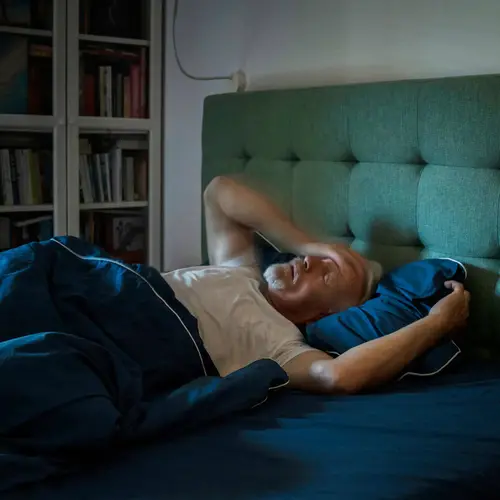By Nicole Jeray, as told to Barbara Brody
When I was in my early 20s, I met a guy who literally made me weak in the knees. He was caddying for me -- it was my first year touring as a professional golfer with the Ladies Professional Golf Association (LPGA) -- and we started dating. He'd make me laugh, my knees would buckle, and I'd drop my soda. I remember thinking, "This must be love!" It turns out it was narcolepsy.
I didn't know it at the time, but what I was experiencing was cataplexy, or the sudden loss of muscle control. It can result from strong emotions. It also happened during golf rounds when I made a good shot. Meanwhile, there were other clues that something was amiss: At night I'd have hallucinations and vivid out-of-body experiences. I was aware of what was going on, yet I was completely unable to move.
And I was so, so tired. I'd fall asleep during action-packed movies and frequently start to nod off while I was driving, which was pretty frightening. I used to chew on ice chips and talk to truckers on a CB to try to stay awake. I could drink an entire pot of coffee and it wouldn't help. Between rounds, I'd take naps in my car -- sometimes three or four naps a day. If there was a rain delay, I was sleeping. My goal was just to stay awake for 18 holes.
I saw a slew of experts, who tested my hormones, prescribed B12 shots for energy, and recommended a vegan diet. Nothing worked. When a sleep expert finally diagnosed me with narcolepsy, I was incredibly relieved, but it took a while to start to feel better.
Diagnosis Leads to Changes
I got my diagnosis in 1996, and back then, treatments for narcolepsy were not great. The first medications I tried made me even sleepier, plus I gained a ton of weight. It wasn't until 2000, when I attended a Narcolepsy Network conference, that things started to improve. Better medications were beginning to hit the market, and talking to other people with narcolepsy has been really useful. I'm also a board member for Wake Up Narcolepsy. It and Narcolepsy Network are nonprofit organizations that work to raise awareness about narcolepsy and support people who have it.
Thanks to advancements in the field, as well as connecting with other patients, I've learned not only about new drugs, but also how to use lifestyle habits to my advantage. As an athlete, I've always been active and eaten healthfully, but in order to stay alert during the day, I really have to be careful about my diet.
When I eat a lot, I tend to get sleepy, especially if carbs are involved. Instead of having big meals, I graze on protein-rich foods like Greek yogurt, hardboiled eggs, string cheese, almonds, and beef jerky. Drinking a lot of water helps, too. I can eat more of a regular meal for dinner, but I have to remember to eat early enough: I can't eat within a few hours of when I take my nighttime medicine.
Going to bed and waking up at the same time each day are also key to getting good rest at night and feeling alert during the day. My typical bedtime is 10:30 p.m. I try to get up at 7 a.m. I never have caffeine after 2 p.m. -- even if I feel myself dragging a bit in the afternoon. I can't afford to disrupt my nighttime sleep. I don't have an extensive wind-down routine. I just brush my teeth, wash my face, and take my medicine. That's because once I'm in my bedroom, sleep is the sole focus. There's no TV in my bedroom. I leave my phone in the kitchen.
When I was touring, I often found myself in a hotel room with a TV in front of the bed. It was a disaster. I'd start watching TV in the middle of the night. The next day, my brain would feel fuzzy. I was more apt to have a cataplexy episode. At home, without a TV nearby, my head hits the pillow and I'm out.
A Normal Life
The hardest thing about having narcolepsy is getting others to take it seriously. So many times, I've tried to explain it, and people say, "I'm tired, too." But my kind of tired is different: Imagine not sleeping for 3 nights in a row. Once, when I was on tour in Asia, my medication was stolen from my hotel room. It wasn't until I went without it for a few days and started falling over with cataplexy 20 times a day that people really started to get it.
Still, most days, I'm thankful. I recently turned 50 and have transitioned from the Legends Tour, the LPGA official senior tour, to teaching golf in Chicago. That makes it easier to maintain a regular routine. My current medication plan includes a drug to help me sleep soundly at night and another that combats cataplexy during the day. It works so well that I actually feel normal most of the time.
Working with a sleep doctor who’s experienced in treating narcolepsy, taking the best-available medications, and learning how to handle my symptoms have been life-changing.

